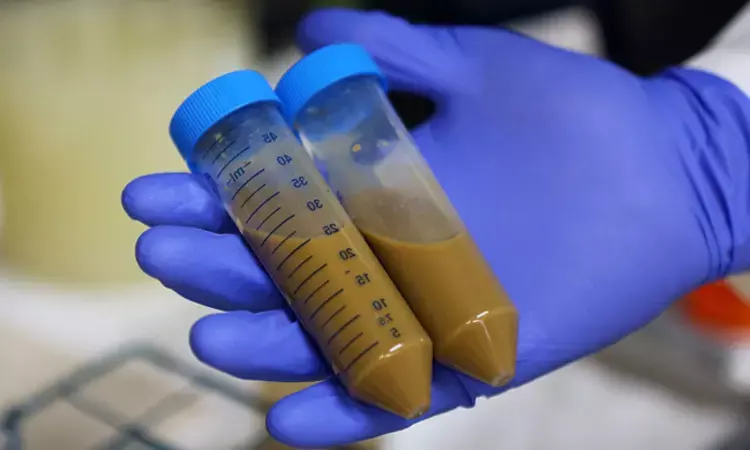- Home
- Medical news & Guidelines
- Anesthesiology
- Cardiology and CTVS
- Critical Care
- Dentistry
- Dermatology
- Diabetes and Endocrinology
- ENT
- Gastroenterology
- Medicine
- Nephrology
- Neurology
- Obstretics-Gynaecology
- Oncology
- Ophthalmology
- Orthopaedics
- Pediatrics-Neonatology
- Psychiatry
- Pulmonology
- Radiology
- Surgery
- Urology
- Laboratory Medicine
- Diet
- Nursing
- Paramedical
- Physiotherapy
- Health news
- Fact Check
- Bone Health Fact Check
- Brain Health Fact Check
- Cancer Related Fact Check
- Child Care Fact Check
- Dental and oral health fact check
- Diabetes and metabolic health fact check
- Diet and Nutrition Fact Check
- Eye and ENT Care Fact Check
- Fitness fact check
- Gut health fact check
- Heart health fact check
- Kidney health fact check
- Medical education fact check
- Men's health fact check
- Respiratory fact check
- Skin and hair care fact check
- Vaccine and Immunization fact check
- Women's health fact check
- AYUSH
- State News
- Andaman and Nicobar Islands
- Andhra Pradesh
- Arunachal Pradesh
- Assam
- Bihar
- Chandigarh
- Chattisgarh
- Dadra and Nagar Haveli
- Daman and Diu
- Delhi
- Goa
- Gujarat
- Haryana
- Himachal Pradesh
- Jammu & Kashmir
- Jharkhand
- Karnataka
- Kerala
- Ladakh
- Lakshadweep
- Madhya Pradesh
- Maharashtra
- Manipur
- Meghalaya
- Mizoram
- Nagaland
- Odisha
- Puducherry
- Punjab
- Rajasthan
- Sikkim
- Tamil Nadu
- Telangana
- Tripura
- Uttar Pradesh
- Uttrakhand
- West Bengal
- Medical Education
- Industry
Oral capsule and colonic administration both demonstrate similar advantages for C. difficile infection

Minnesota: In a prospective trial published in the Journal of Clinical Gastroenterology and Hepatology, fecal microbiota transplantation (FMT) administered through oral capsule or colonic administration showed comparable safety and efficacy for recurrent Clostridioides difficile infection (CDI).
In order to treat Clostridioides difficile infections (rCDI) that are repeatedly recurring and resistant to normal therapy, fecal microbiota transplantation (FMT) was developed. While the majority of rCDI patients have been excluded from placebo-controlled clinical trials because of medical co-morbidities, assessment of FMT efficacy differs among procedures and formulations.
"Management with oral capsules offers benefits of convenience of delivery, lack of a bowel purgative, and absence of colonoscopy associated dangers," they said. Contrarily, colonoscopic administration "delivers the bacteria into its designated compartment in the gut and permits diagnostic examination of the colonic mucosa."
In a sizable, multicentered, prospective real-world cohort, the authors wanted to assess the efficacy and safety of capsule FMT (cap-FMT) and colonoscopy FMT (colo-FMT) for rCDI using standardized materials.
Vaughn and associates used data from the American Gastroenterological Association's national patient registry for their investigation. A total of 269 patients with recurrent CDI were treated in six centers between July 2019 and October 2021 using formulations created by the University of Minnesota Microbiota Therapeutics Program through capsule (n=170) or colonoscopic FMT (n=96) (MTP).The treating physician chose the route of administration, and the FMT formulations were either oral, freeze-dried capsules (MTP-101C) or a frozen, thawed liquid suspension that had been preserved with glycerol for delivery during a colonoscopy (MTP-101LR).
Conclusive highlights:
- Recurrent CDI cure rates were 86% (95% CI 82-90) at 1 month and 81% (95% CI 75-86) at 2 months in the general population.
- Patients who experienced recurrences after their first FMT underwent repeat operations in 41% of cases (range: 2-4), and at two months, 82% of these patients were cured.
- The study's authors highlighted that adverse occurrences were comparable across groups and consistent with earlier publications.
- Constipation (12%), diarrhea (29% at 1 week), gas (22%), and bloating (15%) were among the prevalent changes in bowel habits.
However, Vaughn and colleagues pointed out that it can be challenging to distinguish between gastrointestinal symptoms associated with FMT and those of recurrent CDI.
The report claimed that FMT "effectively breaks the cycle" of recurrent CDI by restoring the host microbiota's variety and function, as opposed to antibiotic therapies, which "perpetuate and aggravate intestinal dysbiosis."
The authors concluded that the safety and effectiveness profile of cap-FMT, which uses freeze-dried capsules instead of a colonoscopy, is comparable to that of colo-FMT. Selection of patients is a crucial element in maximizing the success of FMT, despite being generally quite effective, the researchers added.
REFERENCE
Vaughn BP, et al "Effectiveness and safety of colonic and capsule fecal microbiota transplantation for recurrent Clostridioides difficile infection" Clin Gastroenterol Hepatol 2022; DOI: 10.1016/j.cgh.2022.09.008.
Dr Kamal Kant Kohli-MBBS, DTCD- a chest specialist with more than 30 years of practice and a flair for writing clinical articles, Dr Kamal Kant Kohli joined Medical Dialogues as a Chief Editor of Medical News. Besides writing articles, as an editor, he proofreads and verifies all the medical content published on Medical Dialogues including those coming from journals, studies,medical conferences,guidelines etc. Email: drkohli@medicaldialogues.in. Contact no. 011-43720751


